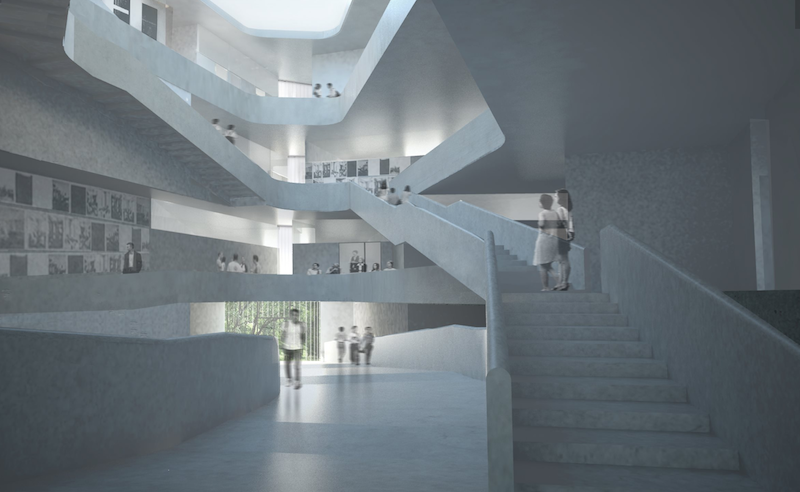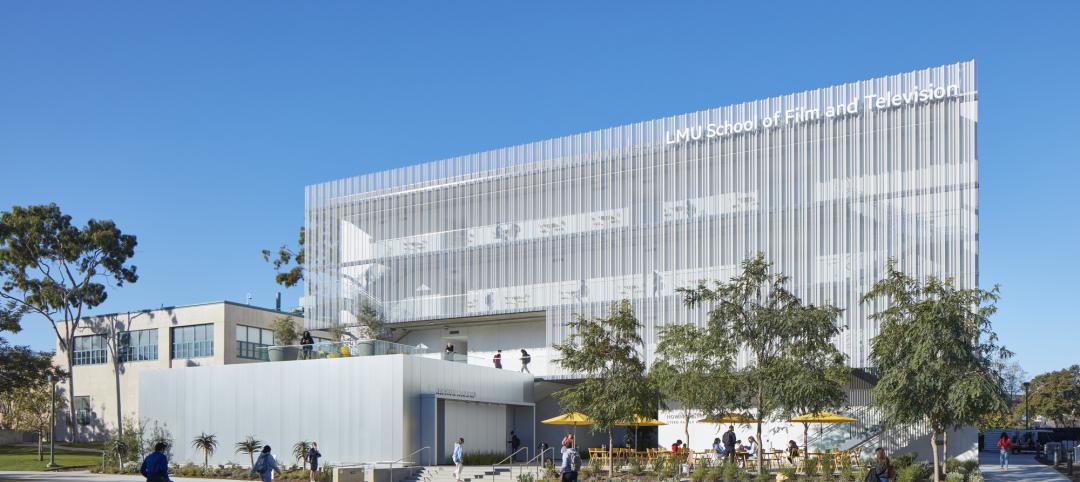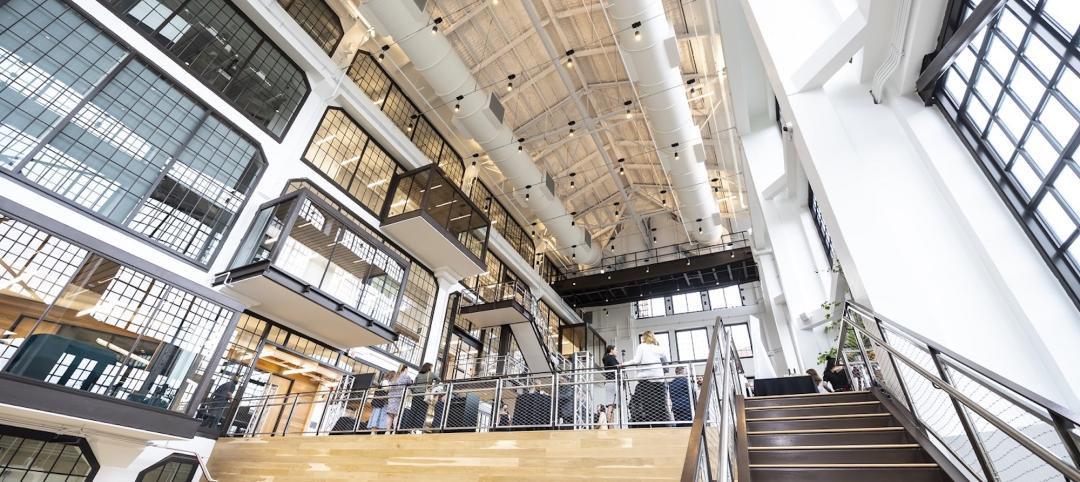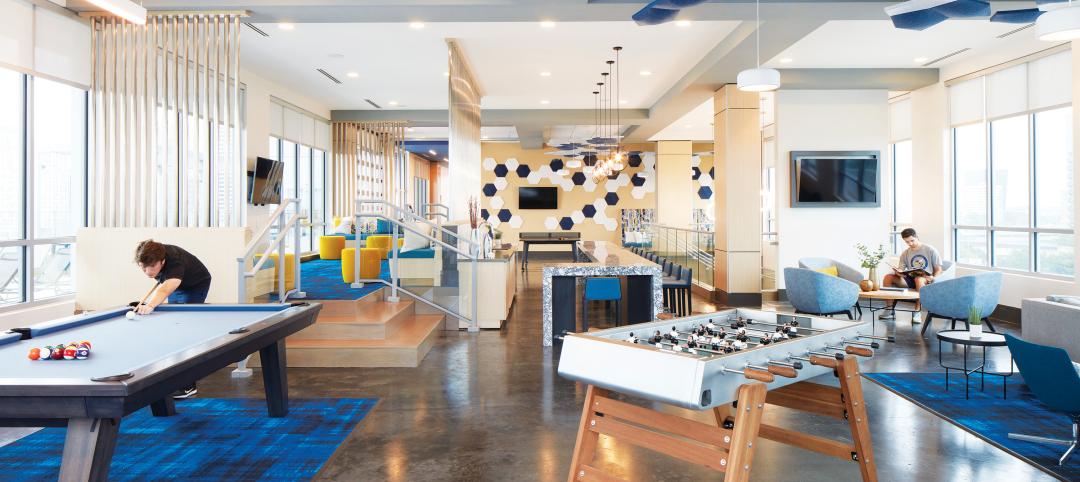The University of Iowa’s new Visual Arts Building is a 126,000-sf facility that will house the functions of the School of Art & Art history, which were previously held in the university’s 1936 Art Building. The new building provides a space for ceramics, sculpture, metals, photography, printmaking, 3D design, intermedia, animation, and graphic design. There is also space for graduate student studies, faculty and staff studios and offices, and gallery space.
The Visual Arts Building uses a punched concrete frame structure composed of cast-in-place concrete to provide thermal mass at the exterior of the building. Meanwhile, “bubble” slabs that incorporate the Cobiax bubble deck system provide radiant cooling and heating.
BNIM, which worked in collaboration with Steven Holl Architects, designed the irregular shape of the building through the use of computer modeling software. This same software was also used to coordinate the installation of the exposed mechanical pipes and ductwork, which proved to be a complex task.
Significant daylighting, natural ventilation at the atrium skylight, thermal mass storage, a thermal active slab heating and cooling system, and highly efficient HVAC systems are key components of the design.
These design components work toward the ultimate goal of the building, which is to provide as much connection and communication between departments as possible. A key aspect of this is the vertical carving out of large open floor plates. Additionally, several vertical cutouts are designed to increase the interaction between the facility’s four levels. The stairs have also been shaped to increase interaction and discussion among the building’s users. Some of the sculptural open stairs stop at large landings with tables and chairs while others open into lounge spaces with built in seating.
The Visual Arts Building officially opened on Oct. 7.
Related Stories
University Buildings | Jan 17, 2023
Texas Christian University breaks ground on medical school for Dallas-Fort Worth region
Texas Christian University (TCU) has broken ground on the Anne Burnett Marion School of Medicine, which aims to help meet the expanding medical needs of the growing Dallas-Fort Worth region.
ProConnect Events | Jan 16, 2023
6 more BD+C ProConnect Events in 2023 – The videos show why you should participate
ProConnects bring building product manufacturers and suppliers together with architects, contractors, builders, and developers to discuss upcoming projects and learn about new products and technical solutions.
Adaptive Reuse | Jan 12, 2023
Invest in existing buildings for your university
According to Nick Sillies of GBBN, students are increasingly asking: "How sustainable is your institution?" Reusing existing buildings may help answer that.
University Buildings | Dec 22, 2022
Loyola Marymount University completes a new home for its acclaimed School of Film and Television
California’s Loyola Marymount University (LMU) has completed two new buildings for arts and media education at its Westchester campus. Designed by Skidmore, Owings & Merrill (SOM), the Howard B. Fitzpatrick Pavilion is the new home of the undergraduate School of Film and Television, which is consistently ranked among the nation’s top 10 film schools. Also designed by SOM, the open-air Drollinger Family Stage is an outdoor lecture and performance space.
Adaptive Reuse | Dec 21, 2022
University of Pittsburgh reinvents century-old Model-T building as a life sciences research facility
After opening earlier this year, The Assembly recently achieved LEED Gold certification, aligning with the school’s and community’s larger sustainability efforts.
Sponsored | Resiliency | Dec 14, 2022
Flood protection: What building owners need to know to protect their properties
This course from Walter P Moore examines numerous flood protection approaches and building owner needs before delving into the flood protection process. Determining the flood resilience of a property can provide a good understanding of risk associated costs.
Adaptive Reuse | Dec 9, 2022
What's old is new: Why you should consider adaptive reuse
While new construction allows for incredible levels of customization, there’s no denying that new buildings can have adverse impacts on the climate, budgets, schedules and even the cultural and historic fabrics of communities.
Student Housing | Dec 7, 2022
9 exemplary student housing projects in 2022
Production continued apace this year and last, as colleges and universities, for-profit developers, and their AEC teams scrambled to get college residences open before the start of classes.
Student Housing | Dec 7, 2022
Cornell University builds massive student housing complex to accommodate planned enrollment growth
In Ithaca, N.Y., Cornell University has completed its North Campus Residential Expansion (NCRE) project. Designed by ikon.5 architects, the 776,000-sf project provides 1,200 beds for first-year students and 800 beds for sophomore students. The NCRE project aimed to accommodate the university’s planned growth in student enrollment while meeting its green infrastructure standards. Cornell University plans to achieve carbon neutrality by 2035.
University Buildings | Dec 5, 2022
Florida Polytechnic University unveils its Applied Research Center, furthering its mission to provide STEM education
In Lakeland, Fla., located between Orlando and Tampa, Florida Polytechnic University unveiled its new Applied Research Center (ARC). Designed by HOK and built by Skanska, the 90,000-sf academic building houses research and teaching laboratories, student design spaces, conference rooms, and faculty offices—furthering the school’s science, technology, engineering, and mathematics (STEM) mission.















